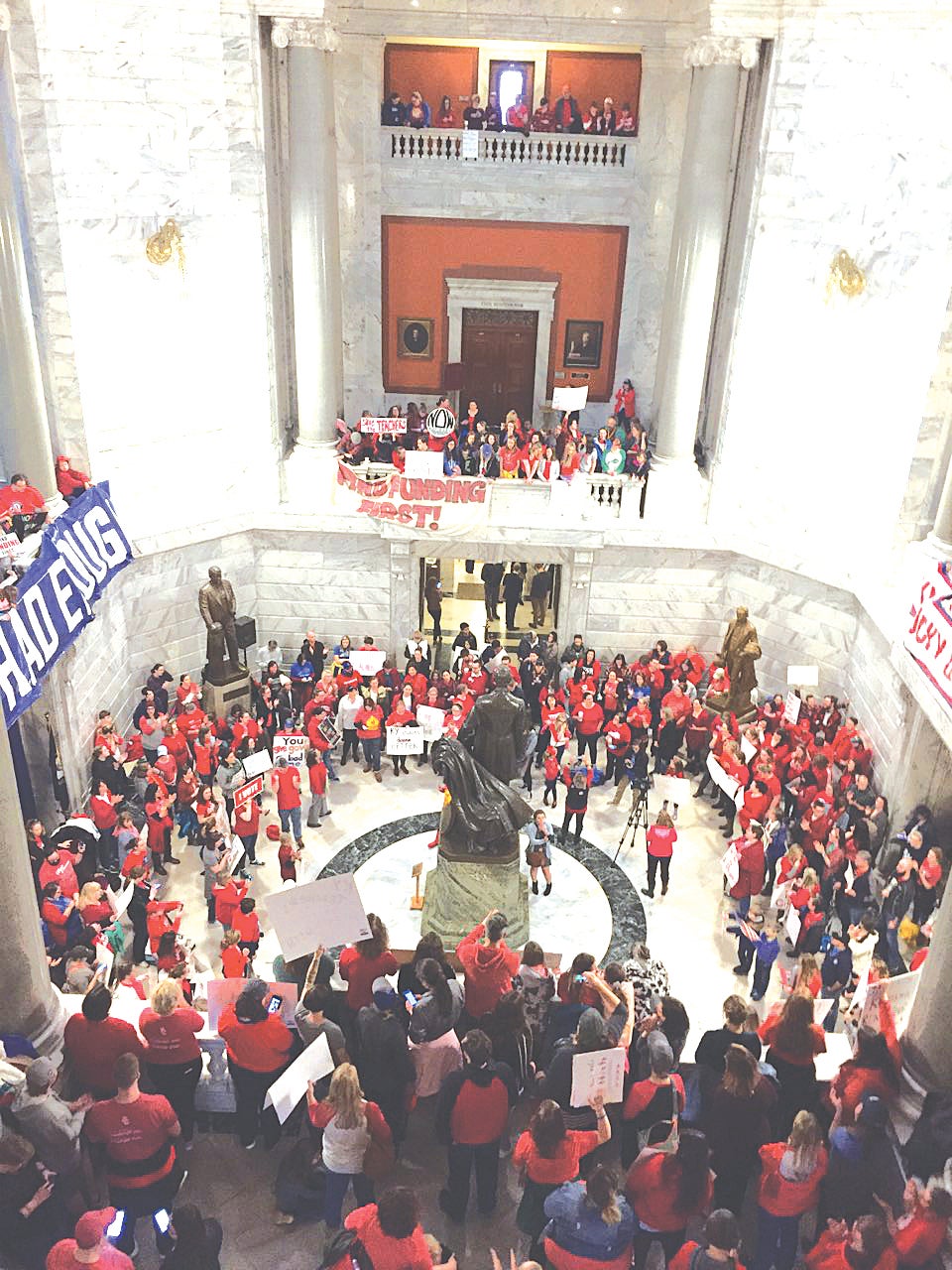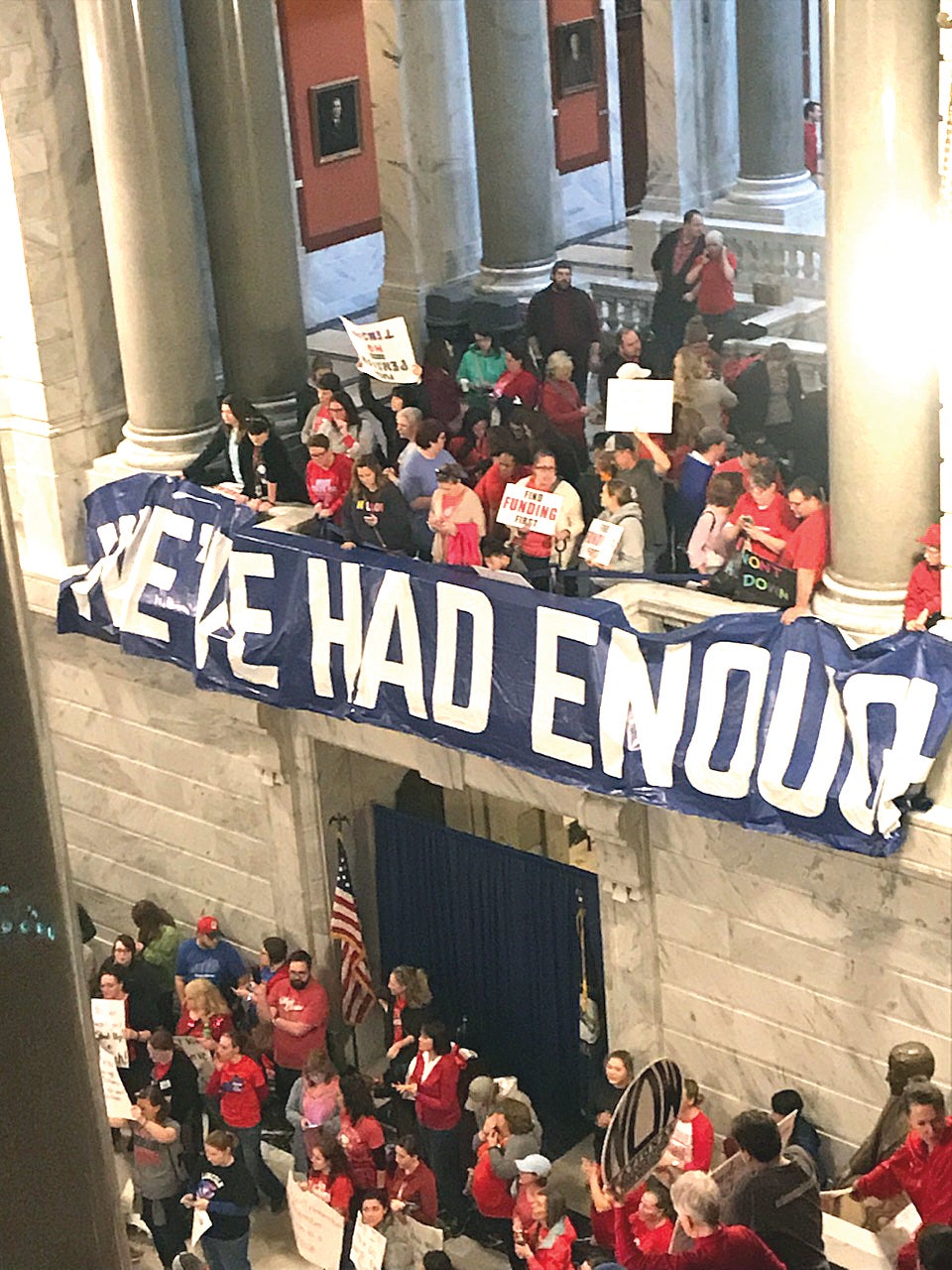Legislature passes surprise pension bill sending shock through state
Published 7:09 am Saturday, March 31, 2018
The sullen, sodden sky over Winchester Friday morning mirrored the sour feelings of school teachers gathered at Shearer Elementary.
Their students weren’t there, after school was canceled because dozens upon dozens of district employees called in sick and there weren’t enough substitutes to fill the vacancies. The situation was repeated in about 20 other school districts after the Kentucky General Assembly rushed a pension bill through over the course of seven hours Thursday in Frankfort.
Hundreds of teachers went to Frankfort Friday to protest the bill, which altered retirement plans for future teachers in hopes of eradicating an estimated $43 billion unfunded liability for the state’s pension systems.
At Shearer, a couple dozen teachers and administrators showed up Friday morning to deliver supplemental weekend backpacks filled with food for students who are food insecure.
“This is amazing,” Shearer Assistant Principal Cathi Harman said. “It’s what we do.”
What happened?
For months, Gov. Matt Bevin has been pushing for pension reform, particularly aimed at teachers, to reverse course on the unfunded liability, which had built over years and several administrations.
The proposed changes, which included eliminating cost-of-living increases for retirees, moving teachers to a 401(k)-style retirement plan rather than a guaranteed pension and restricting use of sick days in calculating retirement benefits have angered teachers across the state.
The original pension bill, called Senate Bill 1, appeared to have stalled in Frankfort. A companion bill, Senate Bill 66, which would stagger increases to retirement contributions for other government jobs to be phased in over several years, also appeared dead.
Thursday afternoon, the House State Government Committee gutted Senate Bill 151, which originally dealt with sewage and wastewater treatment, and tacked on much of SB1. The bill passed that committee 11-7.
As the afternoon progressed, the full House of Representatives voted 49-46 to approve SB 151, which sent the bill to the full Senate. All Democrats and 11 Republicans voted against the bill, with five representatives (two Democrats and three Republicans) not voting.
Late Thursday night, the senate voted 22-15, with all Democrats and five Republicans voting against. One Democrat did not vote.
The Republicans have a majority in both houses.
By 10 p.m., the bill was headed to Bevin’s office for his signature to become law.
Few lawmakers, if any, had a chance to read the full 291-page bill before any votes occurred.
The bill
If Bevin signs SB 151 into law, new teachers would not be eligible for the traditional pension, with a guaranteed return. Instead, they would have a hybrid “cash balance” program for their retirement. The teacher, district and state would all contribute to the program, in differing amounts. Teachers are guaranteed they would not lose money from the program.
It would also increase the retirement eligibility for new teachers would have to work 30 years and be 57 years old or be 65 years old. Current teachers can retire after 27 years of service with no age requirements.
The legislature also revoked the inviolable contract for new teachers, meaning it can adjust retirement benefits at any point.
According to a press release from the Legislative Research Commission, Rep. John Carney (R-Campbellsville) said SB 151 would not violate the inviolable contract, but would allow legislators to make changes to plans enacted in SB 151.
Cost-of-living increases for retired and current teachers, though, remained in place and unchanged.
‘Inaction was not an option’
Notice about Senate Bill 151 was short, to say the least.

State Rep. Donna Mayfield, left, and State Sen. Ralph Alvarado, right.
State Sen. Ralph Alvarado (R-Winchester) said he found out about the bill during a Republican caucus meeting Thursday before the body convened that afternoon. As the members were polled, Alvarado said there was enough support there to move the bill through.
Approving the pension bill Thursday, he said, was critical in order to approve the biennium budget and a relief bill for increasing retirement contributions for local governments in the remaining days of the session.
“This, by passing it (Thursday) night, loosens up all those things,” Alvarado said. “It allows us to restructure going forward.
“As we got started on the budget, it became apparent we had to get pension reform done if we wanted the budget done.”
Friday afternoon, Alvarado posted a lengthy statement on his Facebook page, as well as links to the full bill and the actuarial analysis which was incorporated from Senate Bill 1, but was not available prior to the votes Thursday night.
Alvarado said he was already familiar with SB 1, most of which was incorporated into SB 151. He said senators were given detailed section-by-section breakdowns of the changes prior to Thursday’s vote.
“I felt very comfortable with it,” he said.
His support of the bill, he said, was to preserve the pension as a whole and to hopefully improve the state’s bond rating in the process. It doesn’t mean it was an easy vote, though.
“It’s not a fun thing to do,” he said. “There’s a lot of angst and people are worried, almost blindly so.”
Alvarado said he spoke with a number of people in the business community and other parts of society who supported the reform.
“I think a lot of people who work every day, sacrifice for their families and don’t have a pension understand what needed to be done,” he said. “I think most people know we had to do something.”
State Rep. Donna Mayfield (R-Winchester) did not respond to several calls and a text message from The Sun requesting comment, but posted a lengthy statement on her Facebook page Friday afternoon.
“I believe SB 151 puts our pension systems on a path to solvency, without cutting benefits from our employees or our retirees,” she wrote. “By changing the new hires to the hybrid system, it not only stops us from ‘digging the hole deeper’ but also gives the hires a greater retirement income with a guaranteed base to protect them from any possible market losses.”
Mayfield said she was one of many Republicans who did not support Senate Bill 1, but SB 151 was a better option.
Mayfield said she would have liked to see the introduction of the bill handled differently, though.
“I was not happy with the process of the plan being listed under the title of a waste water bill, but it was necessary to attach it to another number since the deadline for filing new bill numbers had passed,” she wrote. “It was not done for any ‘secrecy’ issues — we were actually glad to present a bill that presents us with the opportunity to introduce a solid and secure retirement plan for all current and future workers.”
Mayfield and Alvarado said SB 151 is the first step in fixing a long-standing problem.
“Further, this problem was created by a group of long-serving politicians that had no interest in fixing our pension systems because it ‘wasn’t easy’ and they worried it might hurt their political career,” Mayfield wrote. “It is not a problem that we in the House majority created — but it is a problem that we promised to fix.”
“I signed up to fix the problem,” Alvarado said. “I could have cast a ‘no’ vote, come home and told the teachers I did it for you. In reality, I wouldn’t have done it for them. I would have done it for me.
“If nothing was done, the pension was in danger of collapse.”
Legal implications
Much of the dispute over the passage of SB151 involves the process, with many questions about the legality of how the bill was passed.
Kentucky Attorney General Andy Beshear announced Friday he will seek legal action to stop the bill.
“I am outraged,” Beshear said in a video posted to his Facebook page Friday. “When the leadership of the House and Senate, in the dark of the night, amended what was supposed to be a sewage bill into what they claim as pension reform, they did it through this amendment, where they didn’t allow any public comment or testimony, they refused to hear from me … they plopped a 291-page bill in front of legislators and made them vote without reading it, and they didn’t even have the required actuarial analysis which would tell you and me whether it would it even work, whether it would save a dime.”
Kentucky Revised Statute 6.350 states actuarial analysis is required for all bills before the General Assembly to increase benefits or participation in state-administered retirements systems.
The statute states such a bill, “shall not be reported from a legislative committee of either house of the General Assembly for consideration by the full membership of that house unless the bill is accompanied by an actuarial analysis.”
An actuarial analysis would show the economic impact of the bill on the state-administered retirement system over a 20-year period.
Calling what happened in the General Assembly Thursday “government at its worst,” Beshear said the bill violates a promise made to Kentucky teachers.
“That bill they passed last night violates the inviolable contract in just about every way that previous bills did ,” he said. “… That contract is a promise that was made decades ago by the General Assembly. They said that if you spend your life teaching our children, protecting our families as a police officer or a firefighter or serving neglected children as a social worker, that while we wouldn’t pay you nearly what you’re worth, we’d guarantee you a solid retirement. They took that promise, they made it into a contract, they passed it into a law and they made that law inviolable, meaning it could never be broken. But last night, the House and the Senate violated that law and broke their word.”
Beshear said if Gov. Matt Bevin signs the bill into law, his office would file suit seeking to overturn, “as much of, if not all of, this terrible bill.”
Although highly vocal throughout the General Assembly, Bevin has had little to say publicly about SB 151, other than a tweet posted Thursday.
“Tonight 49 members of the Kentucky House and 22 members of the Kentucky Senate voted not to keep kicking the pension problem down the road,” Bevin posted on Twitter. “Anyone who will receive a retirement check in the years ahead owes a deep debt of gratitude to these 71 men & women who did the right thing.”
Local uproar
As the drama played out Thursday night in Frankfort, teachers across Clark County and Kentucky were calling, texting or emailing each other.
Shearer Elementary third-grade teacher Carol Clements said she got 89 texts Thursday night before she went to bed “early.”
“I feel badly for the future teachers,” she said. “A lot of my former students are now new teachers.”
The sentiment was repeated many times in the halls at Shearer as teachers showed up to deliver emergency food backpacks to 81 students Friday morning. The bags would have gone home with students Friday afternoon to carry them through spring break next week.
Fourth-grade teacher Shawna Mitchell said the plan to distribute the food bags evolved quickly, over the course of a few hours Thursday night and Friday morning.
“With this being the Friday before spring break, there’s no way they would” pick up the bags, she said. “We felt it was important for our kids to receive these bags.
“It’s a good opportunity for me as an educator to remind the kids how much they are loved. It gives me a chance to look my kids in the eye and say ‘I miss you today, but this is what we had to do.’”
“We’re here because we love our kids,” Shearer Principal Mark Rose said Friday before teachers left on their deliveries.
“Some of these families may not know why we aren’t in school today,” Harman said. “Some people don’t know.”
All were dismayed by the process used to push the pension bill through the legislature.
“I am disappointed in the way our legislators rushed through a bill without time to read it,” said Amanda Terry, a 10-year math interventionist at Shearer. “I’m sad for the future of education in the state.”
“As we watched the news and how it unfolded, we realized how underhanded it was and how we needed to stand up,” Mitchell said. “It’s heartbreaking, and my mom’s a retired teacher. I fight for retired teachers. I have friends who are brand new teachers. It’s heartbreaking to think about a public servant job is that unappreciated by the Kentucky government.”
Teachers outraged
Teachers have been some of the most vocal opponents of previously proposed pension reform, particularly in Senate Bill 1. When news broke SB 151 was passed Thursday night, they began calling off work in what was quickly referred to as a “sick out.”
Fayette County Public Schools were first to close, noting in a Facebook post more than a third of the teachers in the district had called off in response to the legislation.
Clark County Schools were called off shortly after, with more than 100 teachers calling off before 11 p.m. Thursday.
Brian Foudray, a teacher at George Rogers Clark High School, said he and his colleagues are deeply disappointed by the turn of events in the General Assembly.
He said he hand-delivered a petition to Alvarado and Mayfield March 20, which included the signatures of 292 Clark County educators.
Foudray shared the petition with The Sun via email Friday morning, as he was present in Frankfort protesting SB 151.
The petition demanded Clark County legislators “support the state’s effort to find revenue to dedicate to meeting the state’s previously agreed upon financial obligations to TRS. This includes paying all of the state’s previously unpaid obligations to TRS and fully funding the pension in the future; support the previously agreed upon policy of the state to maintain cost of living adjustments and post-retirement health benefits for current and future retirees at least at their current levels.”
The petition also asked legislators not to support “the plan to remove new teachers from the TRS system in favor of individual 401(k) retirement accounts. This effectively defunds and dismantles TRS for future teachers as well as endangering the future stability of TRS for current teachers who are not close to retirement. New teachers must be allowed to fully participate in TRS; the plan to remove teachers’ sick days from calculations of our retirement benefits. Taking away our sick days violates the promise the state made to existing teachers when we were originally hired, and it will put a major, extra financial burden on local school systems when teachers stop saving their sick days and start using them up every year.”
Foudray said because local legislators did not listen to teachers’ pleas, they are outraged.
“We are incensed because, in a variety of votes over the past couple of weeks, Clark County legislators voted to push more of the financial burdens associated with public education and retiree health care down to local and county governments,” Foudray said in an email. “(This) is likely to lead to mass deficits and bankruptcies; to decrease funding of the teachers’ pension system instead of finding new revenue to support it; to remove hundreds of millions of dollars from the retired teachers’ health care fund, thus increasing healthcare premiums for teachers and their families; to remove the financial security provided by a pension from new teachers by forcing them to enroll in a hybrid 401K retirement plan; and to further reduce teacher retiree pensions by removing unused sick days from calculations of and individual’s benefits.”
“This is heinous, and we will not stand for it.”
But teachers did take a stand against it, with hundreds flooding the capital building in Frankfort in protest of the bill.
“We are in solidarity in our utter disgust with our legislators’ most recent votes,” Foudray wrote. “Nearly 300 Clark County educators signed a petition asking for their support for four core principles regarding teachers’ retirement, health care and education funding.
“Yesterday, both of Clark County’s legislators voted against teachers, against our schools and for the wealthy interests — those who do not want to see their taxes raised to pay for public programs in Kentucky. Our legislators voted against our schools, our students, all the families of people who work in the schools or have a young relative who attends, or will attend, public school in Clark County.”
Teachers are planning another mass rally Monday, April 2, in Frankfort as the legislature finalizes the budget.
‘Uncharted territory’
Despite school being canceled Friday, Clark Supt. Paul Christy was meeting with members of his administrative cabinet at central office mulling over the effects of SB 151 on Clark County Schools.
Christy canceled school shortly after 11 p.m. Thursday because of the number of teachers who called off for the day.
“We had 119 call in for absences today,” Christy said in a phone interview with The Sun Friday. “We had 32 substitutes to cover those, which left us with about 85 classes that we wouldn’t have subs for.”
Christy said he ultimately made the decision to cancel school for the day, because the lack of teachers would have significantly reduced the educational success.
“I’m afraid we would have had many more call off before even midnight Thursday if we hadn’t canceled school,” he said. “Being that short on teachers and subs, I don’t think we could be educationally successful or provide a safe environment for the students.”
Christy said in his approximately 12 years working for Clark County schools, he has never seen so many teachers call off.
“The only time we’ve ever come close to something like this was in the middle of a flu epidemic,” he said.
But for Christy, the recently-passed legislation feels a bit like an impending epidemic. One that will likely negatively effect the next generation of students and teachers.
“At first glance of the bill, it looks like teachers currently in the system will be mostly OK,” he said. “There are still some things to look into. But one of the biggest concerns is for new teachers. This bill is very detrimental, in my opinion, to people coming into the field.”
Christy said there is already widespread concern about declining numbers of college graduates entering education careers. He said school psychologists, for example, are highly sought after, but surrounding universities are graduating only one new school psychologist this year.
“Every county in the area is looking for these folks, and there is just one graduating from area universities,” he said.
Christy said teaching programs at Eastern Kentucky University and Morehead State University are seeing nearly 50 percent decreases in the number of teachers graduating this semester.
And legislation like SB 151 makes it that much more difficult for new graduates to choose teaching as a profession, he said.
“My biggest concern is for the future of education,” he said. “The bill hasn’t even passed and it’s already having a negative effect on education.”
Christy fears the legislation will also make it more difficult to retain quality teachers.
“Right now, if a teacher works for 10 or 12 years, they stay because they’ve invested so much,” he said. “But with this new system, they can take that investment with them and go into other employment outside of education. There’s not great incentive for them to stay.”
The fact teacher absences halted the educational process Friday is certainly symbolic of what might play out in the future with this new legislation, Christy said.
“I think this is just a sampling of what’s to come if this (bill) goes through,” he said.
Christy said the missed day will have to be made up because teachers and students must be in school for 170 instructional days.
“That is unless the state education commissioner makes an exception,” he said.
The Board of Education is set to have a special meeting after spring break, which is the week of April 2-6, to determine a closing day and graduation date.
“I hope that this situation can be resolved or at least be worked on enough our teachers feel ready to return to school after spring break,” he said. “I think that teachers called out Friday is certainly getting their voice heard, but this is uncharted territory.”







